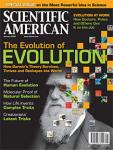
"The Evolution of Evolution: How Darwin's Theory Survives, Thrives and Reshapes the World" is the theme of the latest issue of Scientific American (January 2009), commemorating the bicentennial of Darwin's birth and the sesquicentennial of the publication of the Origin of Species — and NCSE is represented, with Glenn Branch and Eugenie C. Scott's discussion of the newest mutations of the antievolutionist movement in "The Latest Face of Creationism."
Branch and Scott explain that "creationists are increasingly retreating to their standard fallback strategy for undermining the teaching of evolution: misrepresenting evolution as scientifically controversial while remaining silent about what they regard as the alternative. ... Creationism's latest face is just like its earlier face, only now thinly disguised with a fake mustache." But the effects of their efforts are as pernicious as ever: "Telling students that evolution is a theory in crisis is — to be blunt — a lie."
Also featured are David J. Buller on "Evolution of the Mind," H. Allen Orr on "Testing Natural Selection with Genetics," David M. Kingsley on "Diversity Revealed: From Atoms to Traits," Ed Regis on "The Science of Spore," Neil H. Shubin on "The Evolutionary Origins of Hiccups and Hernias," Peter Ward on "The Future of Man — How Will Evolution Change Humans?" and David P. Mindell on "Putting Evolution to Use in the Everyday World."
The staff of Scientific American contributed to the issue as well, with Gary Stix introducing "Darwin's Living Legacy — Evolutionary Theory 150 Years Later," Kate Wong reviewing "The Human Pedigree," and the editors explaining "Why Everyone Should Learn the Theory of Evolution" — "Darwin's legacy has a direct bearing on how society makes public policy and even, at times, on how we choose to run our lives," they comment.
